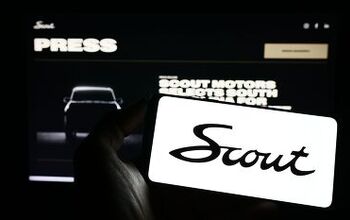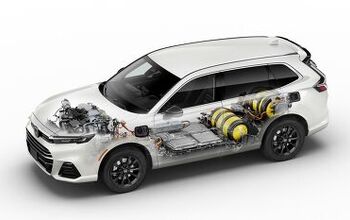California Prepares Counteroffensive in Great American Gas War, Asks Automakers For Ammo

California is considering a formal, public counter-proposal to the Trump administration’s proposed rollback of the existing fuel economy requirements for passenger vehicles. Gearing up for the launch, the state has requested that automakers present detailed information on their future products and explain why they’re seeking relief from fueling mandates they previously agreed to adhere to.
“They’ve never submitted to us any information that would back up those claims in any detail to help us craft a solution,” Mary Nichols, chair of the California Air Resources Board, (CARB), said in a Thursday interview with Bloomberg.
“They’ve never asked for anything specific,’” she said. “They’ve just said, ‘It’s too expensive, too hard, can’t do it.'”
Nichols estimated that automakers will begin providing the requested information over the next few weeks. She also confessed that she was unsure if the state would end up moving forward with a counter-proposal to the National Highway Traffic Safety Administration and Environmental Protection Agency’s “SAFE Vehicle Rule.” But it seems likely, as one of it’s key tenants involves stripping California of its ability to self-regulate.
Officially, CARB is still in negotiations with the federal government as both parties work toward a national fuel economy standard. But neither party seems to be making any overt headway toward a solution the other would find agreeable. Rumors abound that neither side wants to budge and that negotiations have completely stalled, but few involved are prepared to elaborate.
Nichols previously said she’d be willing to negotiate, but hasn’t sounded particularly optimistic. “Unfortunately, by putting out these proposals, the administration has effectively precluded our ability to engage in a conversation with them,” the CARB chair said in August. “We can’t possibly, other than in a formal legal proceeding, suggest alternatives they might like.”
However, Nichols did admit she is still readying a legal defense in case everything goes to pot and California is left without recourse on Thursday. The state’s goal remains fixated on maintaining those Obama-era targets, which would increase corporate average fuel efficiency up to about 47 mpg by 2025. The Trump administration’s proposal recommends freezing those levels at 37 mpg in 2020. “It’s an important goal,” Nichols said. “It reminds of why we’re doing this in the first place.”
For now, federal regulators seem content to continue negotiating with California to seek a national standard that everyone can agree with. However, that change only occurred after automakers pleaded with the government not go to war with California over the fuel rules in August. Manufacturers know a legal battle with the Golden State would likely take years to complete, leaving the industry completely in the dark as they attempt to develop vehicles that could be affected by the final verdict.
California is already suing the EPA for advancing the proposal.

A staunch consumer advocate tracking industry trends and regulation. Before joining TTAC, Matt spent a decade working for marketing and research firms based in NYC. Clients included several of the world’s largest automakers, global tire brands, and aftermarket part suppliers. Dissatisfied with the corporate world and resentful of having to wear suits everyday, he pivoted to writing about cars. Since then, that man has become an ardent supporter of the right-to-repair movement, been interviewed on the auto industry by national radio broadcasts, driven more rental cars than anyone ever should, participated in amateur rallying events, and received the requisite minimum training as sanctioned by the SCCA. Handy with a wrench, Matt grew up surrounded by Detroit auto workers and managed to get a pizza delivery job before he was legally eligible. He later found himself driving box trucks through Manhattan, guaranteeing future sympathy for actual truckers. He continues to conduct research pertaining to the automotive sector as an independent contractor and has since moved back to his native Michigan, closer to where the cars are born. A contrarian, Matt claims to prefer understeer — stating that front and all-wheel drive vehicles cater best to his driving style.
More by Matt Posky
Latest Car Reviews
Read moreLatest Product Reviews
Read moreRecent Comments
- Jeff “So, the majority of our products are either ICE vehicles or intended to utilize those multi-energy platforms that we have. This is a great opportunity for us, compared to our peers, having the multi-energy platforms for all of our products in development and having the agility to move between them,” she said. From what is stated about the next generation Charger it will be released as a 2 door EV and then as a 4 door with the Hurricane turbo straight 6. I assume both the 2 door and 4 door is on the same platform.
- Brendan Duddy soon we'll see lawyers advertising big payout$ after getting injured by a 'rogue' vehicle
- Zerofoo @VoGhost - The earth is in a 12,000 year long warming cycle. Before that most of North America was covered by a glacier 2 miles thick in some places. Where did that glacier go? Industrial CO2 emissions didn't cause the melt. Climate change frauds have done a masterful job correlating .04% of our atmosphere with a 12,000 year warming trend and then blaming human industrial activity for something that long predates those human activities. Human caused climate change is a lie.
- Probert They already have hybrids, but these won't ever be them as they are built on the modular E-GMP skateboard.
- Justin You guys still looking for that sportbak? I just saw one on the Facebook marketplace in Arizona


































Comments
Join the conversation
The automakers easily figured out that the people who are most vulnerable to marketing are also the same people who have the least regard for other people and the environment. Combine the two and we have the automakers profiting most from the the most excessive cars, suv's and trucks. These people then form a political constituency to continue wasting their money, in the name of freedom and their need to impress others. They depict electrified vehicles as unaffordable while handing $10,000 profit per pickup to the manufacturers and spending still more for fuel.
Duaney: You think anyone wants to move to the depressed, opioid-ravaged, small-population states, like KY or WV? stingray65: Automakers don't want to have to redo mileage standards in just 2 years, with federal administration changes.